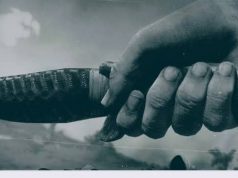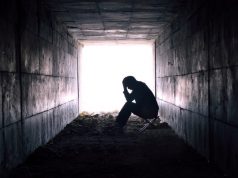A 17-year-old girl sat quietly in one corner of her shed, planning a very difficult task.
She had packed a few clothes inside an old sack and was waiting to see the nightfall.
The village was not noisy except for the occasional movements of motorcycles and donkeys along the only dusty road connecting it to the other villages.
The teenager, Maryam Ali (not real name), an indigene of Bama, Borno State, was not alone in the shed. On her laps was her five-month-old baby, and another two-year-old son slept beside her. The time was about 6 pm on Thursday, November 16.
The two children who were with her made the task difficult, but Ali was fed up; she had to flee from her husband – a Boko Haram terrorist who had captured her from Bama town in the Bama Local Government Area of Borno State in December 2013.
Ali was just a 13-year-old schoolgirl when the terrorists invaded her town, taking her along with a handful of other teenage girls to an unknown location.
“I did not have any rest of mind for a day, being kept with the Boko Haram terrorists in a remote forest,” Ali told our correspondent.
“I was always thinking of my family members. I wanted to escape from my husband, a Boko Haram member, but I could not leave my two children behind. We fled from the camp all night. I did not want any of the terrorists to see us. Two women and I escaped with our children through the bush. By the following morning, we found ourselves in the Gamboru area.”
Gamboru is a border area between Nigeria and Cameroon.
After walking for about six more hours, Ali and her two children got to an Internally Displaced Persons camp in a neighbouring area.
Our correspondent learnt that Ali and the two other women with their little children were received by the government officials at the IDPs camp.
The officials did not want the name of the IDPs camp in print for the sake of the safety of the returnees.
The three young women were bound by a common misfortune. They all are teenagers, abducted from their towns by the Boko Haram insurgents at separate times in 2013 and early 2014; and thereafter married to a Boko Haram member.
The three have a baby each, but Ali has another elder child.
Our correspondent learnt that the women were taken by the Boko Haram insurgents to a village they identified simply as Gom, which is along the Lake Chad in the Monguno Local Government Area of Borno State.
It was from this hideout that they reportedly found their way to Gamboru town in the Ngala Local Government Area.
Women, children in Boko Haram’s den uncountable
While speaking with our correspondent at the IDPs camp where she was receiving psycho-social and medical attention, Ali recalled that there were a large number of abducted women and children in the Boko Haram village she lived and other neighbouring terrorist villages.
Ali, who desired to be reunited with her elder sister in Maiduguri, Borno State, had her photograph taken as the camp officials promised to send the details to Maiduguri as they worked out a possible reunion.

The 17-year-old looked much older than her age, with extremely malnourished children and an old sack of bag which reflected sufferings.
However, Ali noted surprisingly that feeding was not a problem for her and her children in the Boko Haram camp, adding that her husband, as with many other terrorists, was a farmer.
She said, “I was worried about my father and my mother. I was worried that they would be looking for me. This worry is why I am looking unhealthy. I never for a day forgot my parents. I cannot estimate the number of people I met in the Boko Haram camp or left there.
“The Boko Haram terrorists have several villages. The villages are just one or two Kilometres apart. There are a lot of women and children in those villages. Many of the children aged three and below, were given birth to in the camps.
“After being carried away by the terrorists, one of them took me into his shed. He eventually became my husband. I had three children with him. I had a girl and two boys, but the girl died almost as soon as I gave birth to her. I have two boys left.”
The second woman, Halima Jamilu (not real name) gave a similar account of why she fled from the insurgents.
Jamilu, a mother of a four-month-old boy, was abducted in February 2014 in Banki town, also in the Bama LGA. The 18-year-old, who recalled that she was in Junior Secondary School Class Two at that time, said she fled from her terrorist husband because she was desperate to return to her parents.
“I just wanted to return to my parents. Although everything such as feeding was sufficient in my husband’s village, I was fed up with him. I was schooling in Banki in 2014 when the Boko Haram sneaked into our town and I was abducted. I was in JSS 2. It was a government school. I cannot go back to school now. I want to go back to my parents first. Then, the school can come later. At the initial time, I was terrified, staying with my husband, a Boko Haram member and farmer. But somehow, I got used to the terror,” Jamilu said.
She recounted sadly how the terrorists cut short her education and showed her to her parents before taking her away.
She said, “I was in Banki with my father. When the Boko Haram came to our town, they burnt down houses. They took me along with some other girls. One of them came to my father and he was interested in marrying me. My father could not say no. If he resisted, they would kill him. He watched helplessly as I was taken into a truck along with other young women.
“We went with them into the bush. My father was a trader. He used to travel from Borno to Ibadan, Oyo State, before that incident. Ever since I returned last Friday, I have been longing to see him. I don’t know where he is at the moment.”
‘Military aircraft flew over us; we could have been bombed’
Our correspondent learnt that the IDPs camp, where the women were kept, usually received at least 10 fleeing women and children from the Boko Haram terrorists in a week.
One of the camp officials said it might still be hard for the military to get to the location because of the difficult terrain.
Back to Ali, who seemed to have more narrations for our correspondent, she explained that sometimes, they heard the blaring of military fighter jets and there were fears that they would be killed.
She said, “I gave birth to all my children at home in the village. We were not allowed to go anywhere. There was no clinic in the Boko Haram camp. I scarcely followed my husband to the farm. I was mainly indoors. Living with the terrorists is fear. But I had everything at my disposal in terms of feeding. My husband planted maize, sugarcane and watermelons.

“But there was no peace of mind. Sometimes, I heard the scary sounds of military jets and I feared that something like a bomb might drop and I would die with my kids. There was hardly any month that such aircraft did not fly over us.
“Those times, everyone would run inside nearby bushes, in case the military set fire to our sheds from their planes.”
The third woman, who had a seven-month-old boy, was Saratu Audu (not real name). Audu, who resided in Suwasara in the Bama LGA with her parents, recalled that she was abducted when the terrorists invaded a motor park in November 2013.
She said, “My husband saw that I was afraid for many days in his shed. He then promised that he was going to keep me and he would not brutalise me. Since he did not do anything to harm me, I only escaped because I missed my relations.
“I am not missing him. I hope to get someone to marry me again. We saw other Boko Haram members passing through our village with guns and on bicycles. They are the combatants. But I did not see my husband bringing any gun home. I just want to be reunited with my parents.”
Jamilu added that they were always scared each time the military men came around.
“It is true that the women in the Boko Haram villages cannot be counted. Any time the military men came around, we would all run into hiding. Once we heard the gunfire, everyone would hide among the sheds. This was how I lived for three years.
“I am back now. I do not have any plan. My plan for my child is that if he has access to school, it is fine. It is better for him to attend school. There is no discrimination from anyone since we came into the camp,” she said.
Boko Haram terrorists send wives on suicide missions
Although the three women were spared by their Boko Haram husbands, a military source told our correspondent that some other “inconsiderate terrorists” donated their wives to embark on suicide bombing missions.
The source noted that such terrorists, who had risen to the rank of commanders, were supposed to have many wives and trained them to “work for Allah.”
The source, a Captain serving in the North-East, said, “Not all the women are able to escape from the terrorists. Some have died while being sent on suicide errand missions. Sometimes, they die with their babies on their backs. These ones are lucky because they have husbands who have yet to be commanders. Their husbands are Boko Haram members, but they are farmers, who belong to the food suppliers’ category.
“Sometimes when we conduct offensives into the deep locations of the terrorists, we end up liberating some of the people held by the insurgents. What the Boko Haram insurgents do is to try and control people to stay in these hinterlands.
“Our objective is to hit them hard and overrun their positions. We then liberate those people that have been held for years by the insurgents. You will see the excitement on their faces. Many of the women and children are frail because they have been malnourished. They have had no good food and medical care over the years.
“We then try to go with the polio vaccines. We vaccinate them after the liberation. We also escort them to the nearest IDPs camp. It is always our will to get into the hinterlands and liberate more people.”
Our correspondent recalled that the Defence Headquarters, Abuja, in January 2017, confirmed that the Boko Haram terrorists used a new tactic of sending nursing mothers strapped with Improvised Explosive Devices to bomb targeted locations.
The release signed by the then Director of Defence Information, Brig Gen Rabe Abubakar, warned residents of the North-East to be suspicious of female suicide bombers, who disguised as nursing mothers, in their desperate bid to escape the security operatives.
“The female suicide bombers are now evading detection by carrying babies on their backs. This act ordinarily passes them for innocent nursing mothers. The two suicide bombings in the Madagali Local Government Area of Adamawa State are instructive in this regard.
“Members of the public are urged to always volunteer useful information to the security agencies to help us tackle the Boko Haram and their evil machinations in our societies and to make our communities safe and secure for all,” Brig Gen Abubakar had said.

Our correspondent learnt that for Ali, Jamilu and Audu, the three teenagers, the task of finding their relations after spending about four years with the Boko Haram insurgents remains enormous.
Red Cross trying to reunite 11,600 family members
According to the Humanitarian Report (January – September 2017) by the International Committee of the Red Cross, an international aids agency in the North-East, 6,640 persons displaced by the terrorists made requests to reconnect with their family members.
But there are still many others, who are unable to come to the Red Cross because of their remote locations.
The ICRC report partly read, “More than a quarter of displaced persons are searching for their lost relatives. The ICRC, with the help of the national Red Cross societies in the Lake Chad region, is searching for almost 11,600 separated family members.
“Many people lost contact with their families while fleeing the armed conflict or, more recently, when returning to their areas of origin. The situation is complex, as some have been displaced for a very long time, while others have had to flee on multiple occasions. Some decided to return to their home areas and start rebuilding their livelihoods.
“The ICRC works with the Nigerian Red Cross Society to locate, and where possible, reunite the members. Through phone messages and calls, separated family members have been able to get back in touch with their displaced relatives.”
Our correspondent learnt that the United Nations is also making efforts to provide “livelihood skills” to female and male children, who are returning from the Boko Haram camps as a form of psycho-social support.
A Senior Adviser for Child protection, UNICEF Nigeria, Fatima Ibrahim, told our correspondent during an interview in Maiduguri, Borno State, that there had been no case of such women returning to their Boko Haram husbands or camps.
She said, “This is one of the biggest challenges that we have had to deal with. Sometimes, these children can come and they are not even accepted in the community. This is particularly if it is linked to some of these suicide attacks. So the communities are really suspicious. It is a very long journey for them.
“The UNICEF is working with an organisation, the International Alert. They are the ones who work with these children. We call them children; they call themselves women. I know they are about 14 or 15 years and with three children. They usually don’t want to be identified because they feel mad. They fear stigmatisation and sometimes, they are called the bad blood. So the International Alert works with the community leaders to sensitise them to accept these children and support them because they are still the community children.
“You know these children have some attachments and they might likely want to go back and create more problems. So, we provide some support to their babies. What these children usually ask for is livelihood support.
“We have been working with a lot of them in our programme for up to one year. The main thing is to work with them so that they do not go back. As long as the programme has an impact on them, they will continue. So far, there is no report that anyone of them has gone back. But we have had those who were rejected y their communities and we are trying to relocate them to some safer places.
“We usually work with the government ministries, local governments and we also collaborate with partners to do what we call, family tracing and reunification.”




